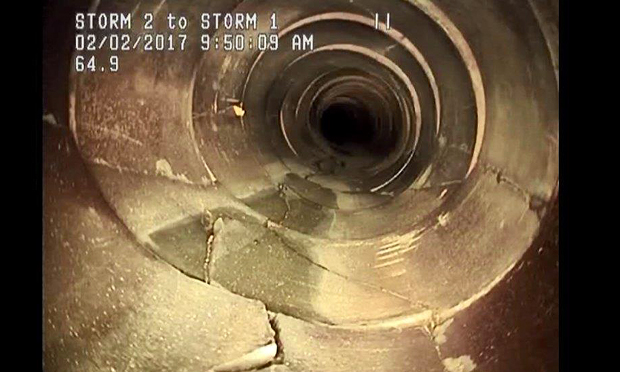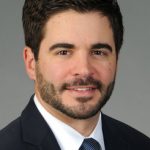Jury Hits Atlanta With $1M Verdict Over Unrepaired Sewer Line
The plaintiffs have been unable to live in the home since remodeling was halted in 2016 when a cracked, century-old sewer line was discovered running beneath the house.
January 02, 2019 at 06:26 PM
5 minute read

A Fulton County jury ordered the city of Atlanta to pay nearly $1 million to a couple who purchased a 1930s-era home in the Virginia-Highland neighborhood only to find out a crumbling century-old sewer line running beneath it meant they couldn't remodel it or live there.
Despite admitting that the the sewer line—which is still in use—belonged to the city, Atlanta officials stiff-armed the couple for over a year, refusing to reroute the pipe, even though funds were available, said attorney Jeffrey Schneider.
 Jeff Schneider
Jeff Schneider“We don't know why this case ever went to trial,” said Schneider, noting that $650,000 of the award was for a nuisance claim.
“This is a really common issue in city of Atlanta,” said Schneider. “Our last proposal was, 'Pay us $50,000 for our expenses, fill in the pipe and repave the driveway, and we'll work it out.' This was not a lottery ticket case; this was a do-the-right thing case.”
“They offered zero dollars and said, 'We don't know when we're going to fix it,'” said Schneider, who represents the plaintiffs with Weissman associate Brandon Arnold.
 Brandon Arnold
Brandon ArnoldThe city is represented by Jason Wright and Donavan Eason of Lewis Brisbois Bisgaard & Smith. An Atlanta spokesperson said the city “is disappointed with the verdict and believes there are legal bases for an appeal” and will file a notice of appeal within the applicable deadline.
According to Schneider and court filings, James Penosky and Shemi Kumar purchased the two-story home in 2015 with an eye toward renovating and expanding it. They got the proper permits from the city in 2016 and began work on the house, only to have their contractor inform them there was a sewer line running across their property and under both the existing house and planned addition.
It was not shown on any documents, and county records contained no indication of any easement for the clay, stone and concrete pipe installed sometime between the 1880s and 1910.
The couple halted work and contacted the city, which first said the sewer was privately owned before confirming it was part of Atlanta's system.
“They had gutted the house under the permit, and the city disclosed that it owned the pipe and said they mustn't do anything else,” Schneider said.
The pipe wasn't leaking “but it was cracked, and the city found voids beneath the house which gave everybody indigestion, and the builder refused to proceed without there being a renovation of the pipe,” he said.
In 2017, the plaintiffs—who have been living in an apartment since they started work on the house—sent the city a demand letter for reimbursement and damages. An email between city officials noted that “once we claimed the pipe and acknowledged a need for repair, we are on notice and must complete the repair within a reasonable time. … If we don't do the repair now, we will face having to buy the house at a later date when the structure of the pipe starts to erode the structural integrity of the house. This will be more expensive.”
Nonetheless, no action was taken, Schneider said. He filed suit in Fulton County Superior Court in July for claims including trespass, nuisance, inverse condemnation and economic damages.
There was evidence that the city had formulated plans to reroute the sewer down the driveway, he said, but never acted on them or told his clients.
The city's portion of the pretrial order said that, after it discovered the cracked pipe, its options for repair included demolishing the house, realigning the sewer line in the street or running it down the driveway.
The plaintiffs “have refused these options and filed this lawsuit instead,” it said.
Chief Judge Robert McBurney ordered the case to mediation last May, but the city still wouldn't budge, Schneider said.
During a three-day trial, the plaintiffs team also included Summer Hughes of Fidelity National Law Group, the insurer that provided title insurance.
Schneider said the city's arguments included that there must have been an easement granted at some time, even if there was no documentation of it, because the sewer line had been in place for so long.
“The legal issue they seemed to hang onto was that, at some point after the Civil War and before World War I, this easement seems to have arisen,” he said. “That may be, but if my clients were not aware of it, they're not bound by it under the bona fide purchaser doctrine.”
That doctrine serves to protect an innocent party who purchases property without being informed of additional claims upon it.
Following a three-day trial, on Dec. 13 the jury took about an hour and a half to award $960,160 in damages, including $45,000 for trespass, $192,000 for inverse condemnation, $73160 in attorney fees and $650,000 for the nuisance claim.
This content has been archived. It is available through our partners, LexisNexis® and Bloomberg Law.
To view this content, please continue to their sites.
Not a Lexis Subscriber?
Subscribe Now
Not a Bloomberg Law Subscriber?
Subscribe Now
NOT FOR REPRINT
© 2025 ALM Global, LLC, All Rights Reserved. Request academic re-use from www.copyright.com. All other uses, submit a request to [email protected]. For more information visit Asset & Logo Licensing.
You Might Like
View All
Georgia Republicans Push to Limit Lawsuits. But Would That Keep Insurance Rates From Rising?
5 minute read
A Plan Is Brewing to Limit Big-Dollar Suits in Georgia—and Lawyers Have Mixed Feelings
10 minute readTrending Stories
- 1Thursday Newspaper
- 2Public Notices/Calendars
- 3Judicial Ethics Opinion 24-117
- 4Rejuvenation of a Sharp Employer Non-Compete Tool: Delaware Supreme Court Reinvigorates the Employee Choice Doctrine
- 5Mastering Litigation in New York’s Commercial Division Part V, Leave It to the Experts: Expert Discovery in the New York Commercial Division
Who Got The Work
J. Brugh Lower of Gibbons has entered an appearance for industrial equipment supplier Devco Corporation in a pending trademark infringement lawsuit. The suit, accusing the defendant of selling knock-off Graco products, was filed Dec. 18 in New Jersey District Court by Rivkin Radler on behalf of Graco Inc. and Graco Minnesota. The case, assigned to U.S. District Judge Zahid N. Quraishi, is 3:24-cv-11294, Graco Inc. et al v. Devco Corporation.
Who Got The Work
Rebecca Maller-Stein and Kent A. Yalowitz of Arnold & Porter Kaye Scholer have entered their appearances for Hanaco Venture Capital and its executives, Lior Prosor and David Frankel, in a pending securities lawsuit. The action, filed on Dec. 24 in New York Southern District Court by Zell, Aron & Co. on behalf of Goldeneye Advisors, accuses the defendants of negligently and fraudulently managing the plaintiff's $1 million investment. The case, assigned to U.S. District Judge Vernon S. Broderick, is 1:24-cv-09918, Goldeneye Advisors, LLC v. Hanaco Venture Capital, Ltd. et al.
Who Got The Work
Attorneys from A&O Shearman has stepped in as defense counsel for Toronto-Dominion Bank and other defendants in a pending securities class action. The suit, filed Dec. 11 in New York Southern District Court by Bleichmar Fonti & Auld, accuses the defendants of concealing the bank's 'pervasive' deficiencies in regards to its compliance with the Bank Secrecy Act and the quality of its anti-money laundering controls. The case, assigned to U.S. District Judge Arun Subramanian, is 1:24-cv-09445, Gonzalez v. The Toronto-Dominion Bank et al.
Who Got The Work
Crown Castle International, a Pennsylvania company providing shared communications infrastructure, has turned to Luke D. Wolf of Gordon Rees Scully Mansukhani to fend off a pending breach-of-contract lawsuit. The court action, filed Nov. 25 in Michigan Eastern District Court by Hooper Hathaway PC on behalf of The Town Residences LLC, accuses Crown Castle of failing to transfer approximately $30,000 in utility payments from T-Mobile in breach of a roof-top lease and assignment agreement. The case, assigned to U.S. District Judge Susan K. Declercq, is 2:24-cv-13131, The Town Residences LLC v. T-Mobile US, Inc. et al.
Who Got The Work
Wilfred P. Coronato and Daniel M. Schwartz of McCarter & English have stepped in as defense counsel to Electrolux Home Products Inc. in a pending product liability lawsuit. The court action, filed Nov. 26 in New York Eastern District Court by Poulos Lopiccolo PC and Nagel Rice LLP on behalf of David Stern, alleges that the defendant's refrigerators’ drawers and shelving repeatedly break and fall apart within months after purchase. The case, assigned to U.S. District Judge Joan M. Azrack, is 2:24-cv-08204, Stern v. Electrolux Home Products, Inc.
Featured Firms
Law Offices of Gary Martin Hays & Associates, P.C.
(470) 294-1674
Law Offices of Mark E. Salomone
(857) 444-6468
Smith & Hassler
(713) 739-1250








